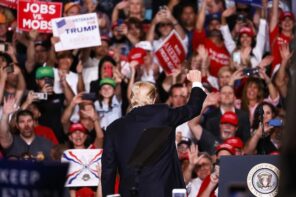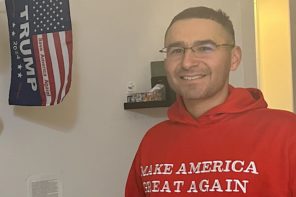In the immediate aftermath of the January 6, 2021 attack on the US Capitol, some commentators seized upon a new way to grasp the insurrectionists: the individuals involved weren’t just political rivals but terrorists—a term that’s been so inextricably linked to Islam in the post-9/11 American imaginary that it cannot be neutrally deployed. The Vanilla ISIS memes came quickly on the heels of this new insight, even as critics cautioned against this framing. Not only does the American past and present offer plenty of parallels and predecessors that help explain the Capitol assault, but the recourse to terrorism tends to dehumanize and pathologize.
Whether they’re viewed as evil incarnate, religious fanatics, nut-jobs, or “wackadoodles,” pathological explanations for political violence remain alluring despite their well-known empirical limitations. That’s because they offer assurance that there’s nothing fundamentally askew with the current political and social order, and therefore stop far short of asking why it’s proven so generative of reactionary forces. Indeed, if far-right movements seem to be flourishing worldwide and there are substantive points of commonality that link them, that’s not because their adherents are all “crazy,” but rather because they’re symptomatic of something rotten in the world that neoliberalism has built.
Having recently completed a new book about the Islamic State (or ISIS as it’s colloquially known) which argues that today’s jihad has little in common with earlier iterations of that phenomenon but does share certain features with far-right movements in the West, I approach the comparative question from a different angle.
Setting aside the terrorism framework, which sidesteps crucial questions about the nature of militant organizations and their appeal at this historical juncture, I instead regard the Islamic State as an instantiation of far-right, authoritarian populism. As such, it’s more fruitful to consider it alongside parallel movements in the West than to the medieval Caliphate.
Crucially, this exercise requires asking why groups that have emerged in such different geographic and cultural spaces—and which would characterize themselves as militant enemies—articulate strikingly similar views of history, visions of political community, and appeals to individual agency, alongside parallel attacks on “the establishment” and the fetishization of violence as the premier form of civic participation. The point is not that the Oath Keepers and ISIS are fundamentally the same, but rather that they’re different manifestations of, and responses to, the neoliberal accord.
Comparisons of this sort shouldn’t be used as grounds for a more expansive deployment of the terrorism label. Rather, situating the Islamic State in a cross-cultural context is fruitful for two reasons: first, because doing so dispels many frequently held myths about jihad as a medieval phenomenon and those who embrace its cause as blood-thirsty fanatics; and second, because looking closely at the Caliphate indicates shifting ideas about individual agency, authority and expertise, governance, and violence that are global in scale.
If the world is against you, you must be doing something right
“This is a time in which most—if not all—of the mainstream media is driven by daily lies and professionalized falsification.” These words came not from former President Trump or his acolytes in yet another “fake news” rant, but from a document posted to the Islamic State’s official Telegram channel in 2016. The context was in explaining the centrality of media production to the overall battle between the forces of Islam and the West. “The media operative is an istishadi [suicide bomber] without a belt!,” as the piece explained.
The document clearly reflected the extent to which the world of the new far right is an online and digitally mediated one. But it also registered something elemental about the way in which such movements position themselves in opposition to “establishment” forces, who are continually pulling the wool over your eyes. “Where should we look to find the truth?,” as a post on the Oath Keepers website asked in April 2021. “There are some places not to look, such as the Mainstream Media,” the piece continued. “That would include most TV news, radio news, newspapers, magazines, etc.”
The attack on mainstream media goes beyond telling the people what they want to hear. It is part and parcel of fashioning the group and its adherents as an elect, a parallel elite of sorts, who bravely face the truth and take matters into their own hands while most either cower in the corner or watch the action from afar.
Affective tropes of the few triumphing over the many abound here, such that it doesn’t matter that yours is a clearly minoritarian position. The Islamic State often invokes the concept of the victorious faction, al-ta’ifa al-mansura, which will be the only one that doesn’t desert the cause of jihad and which will ultimately triumph. If the world seems allied against you, that merely confirms the essential truth of your aim. “We few, we happy few, we band of brothers,” as the Oath Keepers’ motto (itself lifted from Shakespeare’s Henry V) has it.
It’s important to note how such narratives also serve to impart individuals with a sense of agency and importance. Rather than appeal to some sort of blood lust, as is often imagined, what the Islamic State holds out is the prospect of effecting meaningful change in the immediate term. As one mujahid implored in 2014, “You can be here in these golden times, fighting, or you can be on the sidelines commentating. It’s your choice.”
The individual is therefore confronted with an enormous moral choice between action and sloth, jihad and business as usual. The affective appeal to individual agency highlights something elemental about the new far right: though it ostensibly rejects the liberal order, it nonetheless embraces many of its foundational assumptions about the primacy of the individual. The oppositional project is thus marked by an inability to articulate a vision outside of the normative epistemic framework in a way that’s reminiscent of other “traditionalist” movements. Consider, for instance, the way the American religious right has long sought the imprimatur of science to affirm its biblical view of the origin of the universe.
If this appeal to individual agency serves as one of the central acts of seduction within the new far-right, it’s important to consider it alongside the widespread civic paralysis that is one of neoliberalism’s most noteworthy social effects. Mary Kaldor, for instance, has described the “individualism and anomie that characterizes the current period” as creating a sort of political vacuum:
“the sense that political action is futile given the enormity of current problems, the difficulty of controlling or influencing the web-like structure of power, the cultural fragmentation of both horizontal networks and particularistic loyalties.”
This is one way to understand why members of the Oath Keepers speak of “finding a sense of purpose and fellowship” within the group. In a world in which pathways for civic participation are mostly hollowed out, and material conditions render genuine community increasingly rare, it’s no wonder that organizations that can offer some semblance of agency and community attract adherents.
The unfortunate irony is that the “solutions” proffered by the new far-right to neoliberalism’s crises nevertheless underscore the primacy of that order and its logic. “The Army gave me a sense of purpose, like I was doing something good. What’s worth doing now?” as one Oath Keeper member reflected during the anti-racism protests last summer. “I finally feel like guarding this Shell station is something I can do to help. Preserving our way of life is worthwhile.” This double movement of negation and mimicry is constitutive of many far-right movements operating today, which underscores why the pathways they chart for the future can never be broadly emancipatory.
So too the militant embrace of Islam, with jihad as its mode of actualization, is one response to this shared sense of frustration with politics as usual. The intense critique of entrenched and self-serving political, religious, and economic elites evident within Islamic State media and messaging isn’t just about creating a contrast with the supposedly just nature of the Caliphate and its agents; it also reflects a broadly felt sentiment in many of the post-colonial states in which the Islamic State operates.
The appeal to mobilization vis-à-vis jihad, however few heed its call, cannot be understood outside this sense of disenchantment with the status quo and its champions. That the society the Islamic State proposes to build on the ruins of modernity’s -isms holds little promise for real human flourishing should not, amid this time of ascendent far-right movements worldwide, be regarded as an anomaly.
A ‘domestic’ war on terror?
Taken as a whole, such comparisons yield a set of interlocking narratives and practices that register a global crisis of legitimation—of states and democratic governance, of traditional elites, indeed even of knowledge and expertise. Again, it’s worth underscoring that these similarities don’t render far-right movements in the West essentially the same as militant organizations like the Islamic State.
But there is a risk in exaggerating these differences as well—for instance, in leaning on exotified notions of “holy war” to advance false binaries about the supposed battle between tradition and modernity or Islam and the West. Placing these strange bedfellows in conversation strips away some of the mystique by gesturing at the origins of reactionary movements in structural forces that are global in nature, however unevenly experienced.
Perhaps most hopefully, this exercise also indicates the type of policy shifts and cross-cultural alliances that are needed in this moment. At the very least, surveying the disastrous effects of the Global War on Terror should short-circuit any temptation to wage a domestic counterpart. The pursuit of security through state violence has not yet yielded the promised peace in the Middle East, North Africa, or Central Asia. There’s no reason to believe this strategy will bear less bitter fruit on the homefront.





